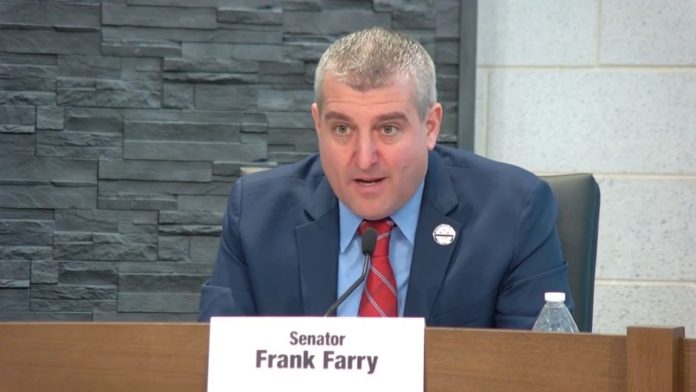Given Lower Bucks County’s close proximity to Philadelphia, it makes sense that many residents from Bensalem Township and surrounding municipalities commute to jobs in the City of Brotherly Love. However, the current taxing model isn’t so lovely for these suburban areas.
The Sterling Act, enacted in 1932 to assist Philadelphia following the Great Depression, imposes a City Wage Tax on salaries, wages, commissions and other compensation paid to workers who are employed within the city, even if they are non-residents or work remotely.
This means that, if a Bensalem resident is employed by a Philadelphia-based company, the wage tax of 3.44 percent goes entirely to the city, with none remitted from Philadelphia to the employee’s home municipality, unlike every other municipality in Pennsylvania.
In an effort to draw attention to this issue and its impact on suburban communities, state Sen. Frank Farry hosted the Senate Majority Policy Committee for a public hearing earlier this month at the Middletown Township Municipal Building. The panel included Sens. Dan Laughlin, Kristin Phillips-Hill, Jarrett Coleman and Devlin Robinson, and Sheila Sterrett, executive director to the Policy Committee.
“The fact that these senators have taken interest in this issue, as has our Senate Republican leadership, it is very warming to me,” said Farry, who has been trying to spotlight the unfairness of the Sterling Act for a decade.
Over the span of two hours, testimony was heard from several individuals, including Bensalem Township Mayor Joe DiGirolamo. In past interviews with The Times, he expressed great pride in the township’s first responders, particularly the police department. However, with the rise in crime, 80 percent of which he said comes over from the city, he fears that safety services will decline without these tax dollars.
It’s estimated that Bensalem is shortchanged by $2.5 million annually because of this tax inequity. Plus, to make up that lost revenue, the burden falls on the rest of the residents.
“We are not asking for anything unfair,” said DiGirolamo. “A fair and simple solution to remedy this inequality, and to give my community and our suburban neighbors the tools necessary to adequately serve and protect our communities, is for Philadelphia to remit to the suburban communities a share of the Philadelphia Wage Tax in an amount equal to our local EITs. In the case of Bensalem, it would be our 1 percent.”

DiGirolamo even suggested that, in order to make things less burdensome on Philadelphia, this be implemented in stages over the span of five years.
“It’s common sense. There is no magic bullet,” he said. “It’s common sense that every other town has to give back to their hometown, the 1 percent tax.”
Joseph Pizzo, Bensalem Township solicitor, shared details on the Sterling Act’s history. Over the years, numerous attempts have been made to change it, both at the legislative and judicial levels. Yet time and time again, the majority of elected officials don’t want to be responsible for causing such an upheaval in the city’s budget.
“We have been kind of an island of fighting this battle over the years,” said Farry.
Throughout the height of the COVID-19 pandemic, former state Rep. Wendi Thomas, who flew in from her retirement in Florida for the hearing, became a go-to resource to help Bucks County residents navigate Philadelphia’s confusing tax requirements.
Philadelphia workers who lived outside the city could receive a City Wage Tax refund if their employer required them to work from home. If remote work was only optional, they still had to pay. However, even those mandated to work remotely weren’t guaranteed a refund because the city required a note from their employer on company letterhead. Despite following all of the steps, many were denied a refund for no reason, including one Bucks man who worked for the federal court system in Philadelphia.
Thomas stressed that the battle against the Sterling Act isn’t meant to be “anti-Philly.” This fight is all about fairness.
The City of Philadelphia provided a written testimony, which stated, “The city’s Department of Revenue estimates that the city would lose about $190 million of existing tax revenue if every jurisdiction enacted a 1 percent earned income tax.”
Farry stressed that this statement is proof of the harm that Philadelphia is causing to the rest of the commonwealth, not just Bucks County. That $190 million, he said, should be put into local government operations and services, or back in taxpayers’ pockets.
“We have tried for well over a decade to shine the light on this issue that greatly affects our residents and our municipalities,” said Farry. “Whether you work in Philadelphia or not, this impacts you because you have to pay higher property taxes to fund your municipality. On top of that, those whose employer is in Philadelphia, but are really working from home, are still forced to pay the tax even though these employees never set foot in the city.”
Laughlin added, “The Policy Committee serves as a staging ground where legislative ideas can be critiqued and improved. The Sterling Act is a perfect example of an outdated law that needs improvement to help the local community here in Bucks County and other surrounding areas.”
Samantha Bambino can be reached at [email protected]


